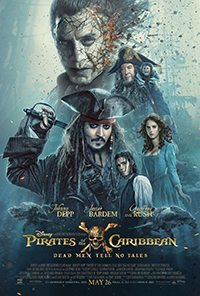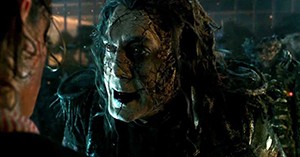 The “Pirates of the Caribbean” franchise is a lot like a fun uncle who seemed kind of hip and cool when you were twelve. Now he’s just a little embarrassing both in present time and in retrospect. It’s not only because he’s still wearing sunglasses indoors, or even that he’s trying to cover that bald spot with inappropriately long hair; mostly it’s because you realize that everything that made him seem so hip and cool boils down to the fact that he was just as immature (and frankly, stupid) as you were at the time. But hey, he still throws a good party – even if all he’s got in the fridge are wine coolers.
The “Pirates of the Caribbean” franchise is a lot like a fun uncle who seemed kind of hip and cool when you were twelve. Now he’s just a little embarrassing both in present time and in retrospect. It’s not only because he’s still wearing sunglasses indoors, or even that he’s trying to cover that bald spot with inappropriately long hair; mostly it’s because you realize that everything that made him seem so hip and cool boils down to the fact that he was just as immature (and frankly, stupid) as you were at the time. But hey, he still throws a good party – even if all he’s got in the fridge are wine coolers.
“Dead Men Tell No Tales,” the fifth movie in a franchise that’s been growing long in the tooth as far back as its second installment, is exactly that: it’s a wine cooler. It’s Mike’s Hard Lemonade. It’s light, it’s colorful, and kills your brain cells, but it’s fun. It’s something you enjoy in private, or sheepishly explain away as a guilty pleasure. Sure, you don’t want anyone to know you’re seeing it without an airtight excuse (“Seriously guys, I had to review it for The Dagger”), but that’s the good thing about movie theaters – they lower the lights.
With all that said, it’s a surprisingly entertaining film with more charm than one would expect this far into its life (and death) cycle. Abandoning the stupid attempts to mythologize that made later installments so po-faced and dour, “Dead Men Tell No Tales” remembers that the source material isn’t Joseph Campbell: it’s an amusement park ride. That’s about as shallow and superficial a Hollywood pitch as one can possibly imagine, and yet by taking the iconography of pirates and naval warfare and then Xeroxing the “Star Wars” leads in the form of Orlando Bloom (idealistic Luke Skywalker), Keira Knightly (feisty Princess Leia), and a scene-stealing Johnny Depp (thief-with-a-heart-of-gold Han Solo), “Pirates of the Caribbean” was an unexpected hit in 2003. Three overwrought sequels followed that killed the franchise more effectively than that brief but painful “pirate couture” thing that prompted grown men to dress like waiters from a theme restaurant. It was hard not to roll your eyes at a series that, after becoming an overnight success, had then forced us to endure a slow, painful, altogether desperate attempt to keep itself on life support for the next decade; yet this latest installment brings us back to what we all liked about the original installment, and it is perhaps all the more enjoyable due to expectations so low they’re practically bruising our shins.
Keeping with the current trend of relaunching a dormant series by essentially remaking the first film (aka the “soft reboot”), “Pirates of the Caribbean: Dead Men Tell No Tales” should be more appropriately subtitled “Dead Franchises Retell the Story You Liked Instead of the Other Three You Didn’t.” This time we have the son of Bloom’s Will Turner, Henry (Brenton Thwaites, doing an earnest Legolas impersonation so accurate as to be both scary and hilarious); Henry must team with Depp’s Captain Jack Sparrow and the latter’s old nemesis Barbossa (Geoffrey Rush) to discover Poseidon’s Trident – the only thing that can thwart the undead Captain Salazar (Javier Bardem). They sail from place to place, experience near-captures, heart-pounding escapes, and unresolved paternal issues. There are no people in this film, there’s very little story, and what there is has been plundered. If you’ve seen the original, you’ve seen this one too.
 However, when a film is based on an amusement park ride, spectacle should be the objective, and in that sense “Dead Men Tell No Tales” delivers. Perhaps the ongoing leaps and bounds in computer-generated wizardry has allowed filmmakers the opportunity to level up, or perhaps the change in creative team have brought fun, new ideas to the table. Whatever the reason, this new “Pirates” brings the rollercoaster. The environments utilized for the adrenaline-charged set pieces are unique: we see a balletic chase across a series of opposing naval cannons, and a climactic encounter involving a desperate attempt to climb a chain between a narrowly (and magically) parted sea that’s rapidly closing in on itself. The recent ability for animators to de-age actors during flashbacks is here used on Depp for Jack Sparrow’s origin story; the uncanny valley is still steep, but even in the two years since “Ant Man,” the technology continues to both improve and astound. Even more impressive are the undead pirates, who appear with tops of heads missing and disconnected torsos that flake and expel the cindery result of their fiery deaths; the achievements in utilizing negative space in digital characters and motion-captured actors is strikingly original. A sequence in which the spectral army charges across the surface of the ocean in pursuit of our heroes is particularly arresting, and a jump moment involving a rotting shark is a fantastic marriage of choreography, effects work, and sound design. The film is very loud, very colorful, and very fun to watch. The fact that it’s pretty stupid becomes easier to swallow when washed down with the visual equivalent of fruit-flavored booze. Arr!
However, when a film is based on an amusement park ride, spectacle should be the objective, and in that sense “Dead Men Tell No Tales” delivers. Perhaps the ongoing leaps and bounds in computer-generated wizardry has allowed filmmakers the opportunity to level up, or perhaps the change in creative team have brought fun, new ideas to the table. Whatever the reason, this new “Pirates” brings the rollercoaster. The environments utilized for the adrenaline-charged set pieces are unique: we see a balletic chase across a series of opposing naval cannons, and a climactic encounter involving a desperate attempt to climb a chain between a narrowly (and magically) parted sea that’s rapidly closing in on itself. The recent ability for animators to de-age actors during flashbacks is here used on Depp for Jack Sparrow’s origin story; the uncanny valley is still steep, but even in the two years since “Ant Man,” the technology continues to both improve and astound. Even more impressive are the undead pirates, who appear with tops of heads missing and disconnected torsos that flake and expel the cindery result of their fiery deaths; the achievements in utilizing negative space in digital characters and motion-captured actors is strikingly original. A sequence in which the spectral army charges across the surface of the ocean in pursuit of our heroes is particularly arresting, and a jump moment involving a rotting shark is a fantastic marriage of choreography, effects work, and sound design. The film is very loud, very colorful, and very fun to watch. The fact that it’s pretty stupid becomes easier to swallow when washed down with the visual equivalent of fruit-flavored booze. Arr!
The actors are generally as fun as expected, with the exception of Thwaites (a living mannequin that even the screenplay doesn’t know how to embed in the story): Rush is his usual sneering self, but Bardem’s ghoulish Salizar surpasses Barbossa’s previous villainy; Bardem excels at disgusting, yet oddly sympathetic, characters. Bloom returns for bookend appearances, and even Paul McCartney’s painfully unfunny cameo as Jack Sparrow’s uncle isn’t as distracting as Will Turner’s ever-widening jaw. Orlando Bloom is beginning to look like the LEGO version of himself.
 The standout is the leading lady, Carina Smyth (Kaya Scodelario), in full Carrie Fisher brass-balls mode. Her character, scientifically-attuned, is labeled a witch by the ignorant, patriarchal Englishmen who make repeated attempts to execute her for stargazing and lockpicking. There’s nothing particularly original about a spunky brunette waif with an accent snarking her way through a film of this sort (SEE: “The Force Awakens,” “Rogue One”), except that her “super power” is education. It’s refreshing to see a female lead in an action blockbuster who uses science and knowledge rather than her fists, and she’s a more valuable role model for young girls than someone like Wonder Woman who was born into power; this girl studies for it.
The standout is the leading lady, Carina Smyth (Kaya Scodelario), in full Carrie Fisher brass-balls mode. Her character, scientifically-attuned, is labeled a witch by the ignorant, patriarchal Englishmen who make repeated attempts to execute her for stargazing and lockpicking. There’s nothing particularly original about a spunky brunette waif with an accent snarking her way through a film of this sort (SEE: “The Force Awakens,” “Rogue One”), except that her “super power” is education. It’s refreshing to see a female lead in an action blockbuster who uses science and knowledge rather than her fists, and she’s a more valuable role model for young girls than someone like Wonder Woman who was born into power; this girl studies for it.
Captain Jack Sparrow, by contrast, is the least interesting part of an entire series that’s been built around him. By his very nature, he’s a secondary character and not a lead. He’s comic relief, albeit now clichéd and repetitive. Yet his immense popularity has resulted in his narrative promotion such that he continues to be a catalyst for the plot despite lacking heroic attributes unless by accident, rendering him a passive observer in his own story. He’s all tics and theatrics, not a character – Depp at his idiosyncratic worst.
The film naturally ends with a post-credits tease for the inevitable “Pirates of the Caribbean 6.” Maybe if the filmmakers get around to creating a worthy successor to Depp, there might be the opportunity to breathe new life into the franchise now that it’s got a little wind back in its sails; otherwise, bury this and lose the map.
Directed by Espen Sandberg and Joachim Rønning
Written by Jeff Nathanson
Rated PG-13 for sequences of adventure violence, and some suggestive content



Leave a Reply
You must be logged in to post a comment.